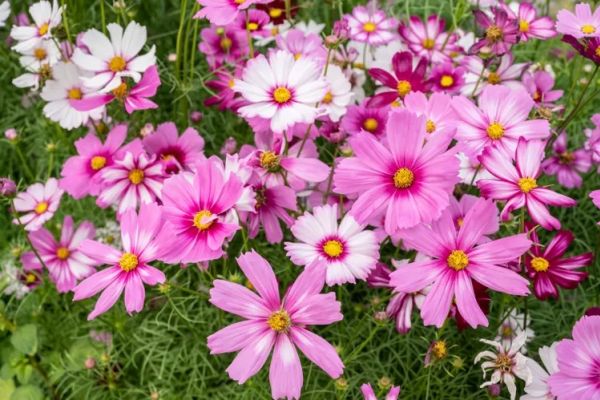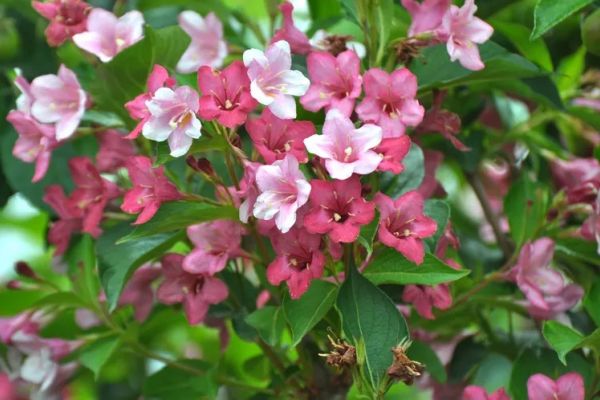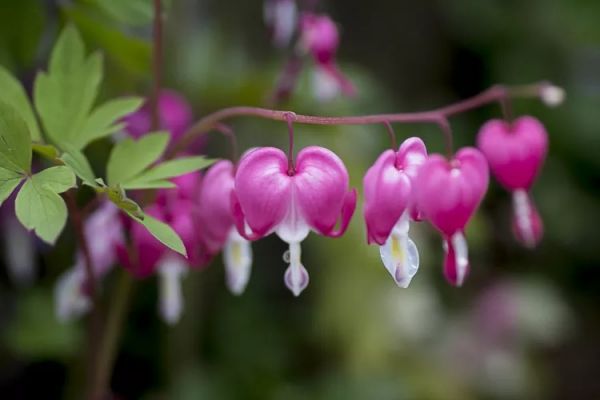Pink flowers are one of the beautiful color plants that can be planted in your garden to enhance the look and beauty of your garden. Here are the top 20 pink flowers that will add timeless elegance to your garden:
1. Astilbe
Astilbe also known as Astilbe spp. is a plant that blooms its flowers in late spring to late summer, depending on their variety. They are a perennial plant that blooms feathery pink-colored flowers with foliage that looks like ferns and bloom well when they are in shades.
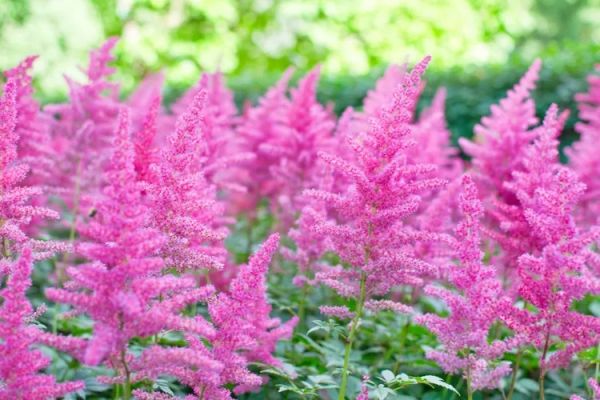
- Size: 6 to 24 inches
- Growing conditions: Partial to full sun; loamy, moist soil
2. Azalea
Azalea also known as Rhododendron spp. is a shrub that can attract many pollinators, including bees, butterflies, and hummingbirds. They attract many pollinators as they have scented flowers that entice pollinators in the spring. Azalea are native to eastern United States.
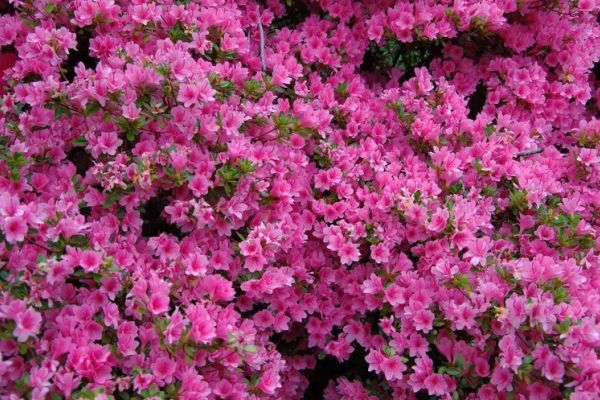
- Size: 3 to 20 feet
- Growing conditions: Partial to full sun; well-drained soil
3. Camellias
Camellias also known as Camellia spp. that blooms during the fall or early winter and helps to attract a wide variety of pollinators. Their flowers have prized for their large, pink-colored flowers that has beautiful glossy evergreen leaves and can offer year-round color for your garden.
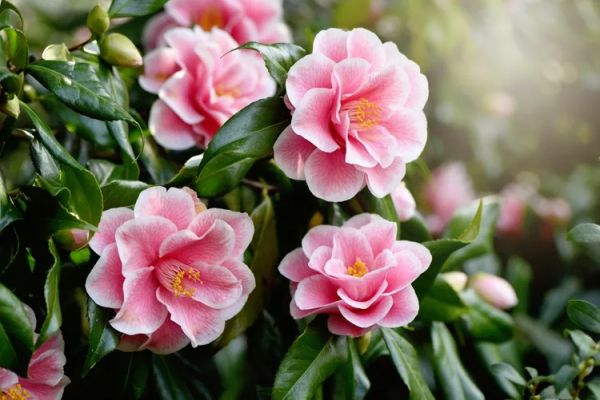
- Size: 2 to 12 feet tall
- Growing conditions: Partial shade; moist, well-drained soil
4. Carnations
Carnations
Carnations (Dianthus caryophyllus) are a common flower you’ll find in bouquets at your local florists. “Carnations are commonly grown for cut flowers, as they can survive as long as two to three weeks in a vase when properly cared for,” says Ohler. They’re also fun to grow in the garden with their fragrant, small, pink-hued blossoms with fringed petals. “Pink carnations also have long-lasting blooms when left in the ground, offering vivid color for many weeks during the spring and summer,” says Ohler. “These charming pink flowers typically appear in late spring to early summer and may continue blooming intermittently.”
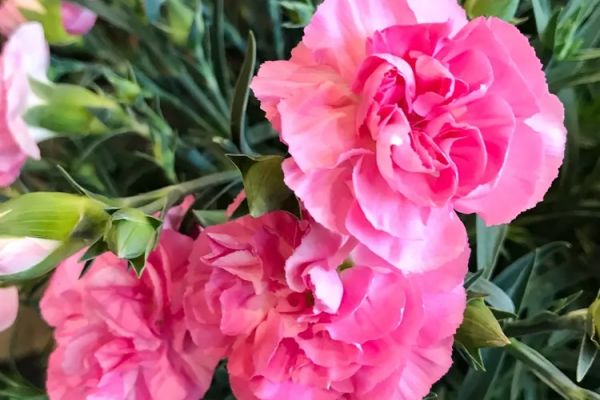
- Size: 6 to 36 inches tall
- Growing conditions: Partial shade to full sun; moist, well-drained soil
5. Cosmos
Cosmos also known as Cosmos bipinnatus is a plant that has a delicate crinkled bloom edge flower that gives it the appearance of a pale pink-colored cupcake liner. It is an easy-to-grow plant that can even grow well in unhealthy and unfertilized soil. They also bloom more the more you cut them as they’ll pump out for you all season long.
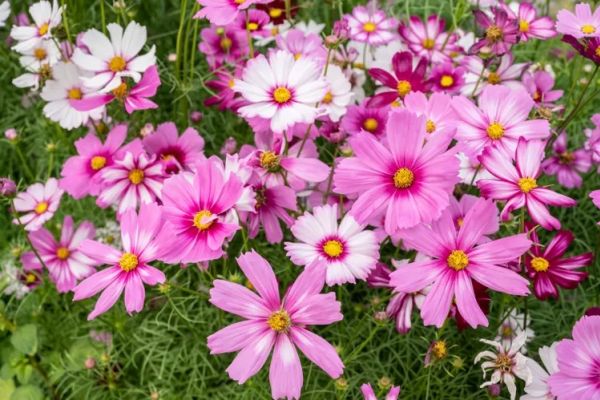
- Size: 1 to 6 feet tall
- Growing conditions: Full sun; well-drained soil
6. Chrysanthemum
Chrysanthemums also known as Chrysanthemum X morifolium or mums have a decent degree of deer and rabbit resistance as well they are drought tolerance. They have big daisies or pom-poms that grow annuals which can be enjoyed as a seasonal color on your deck, patio, porch, or balcony.
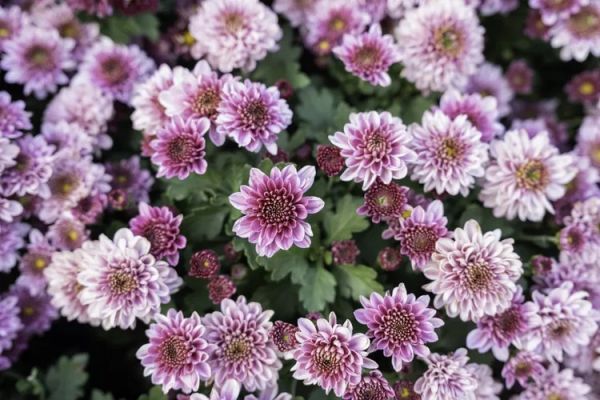
- Size: 4 to 6 inches
- Growing conditions: Full sun; well-drained soil
7. Coneflower
Coneflowers also known as Echinacea purpurea leave coneflowers up from the fall and winter season which then feeds goldfinches with their copious seeds inviting these birds to your garden. They are native to most regions in the U.S.A an they can also thrive in harsh weather.
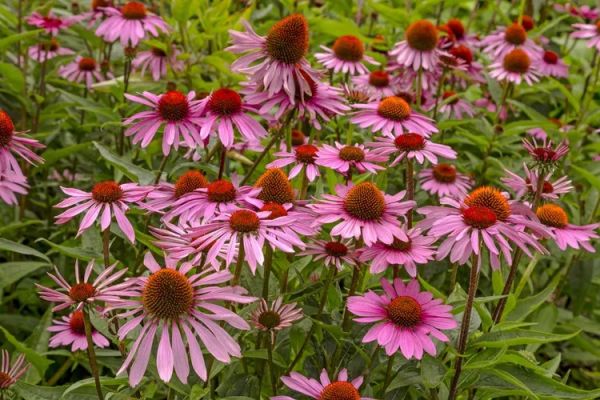
- Size: 2 to 5 feet tall
- Growing conditions: Full sun; well-draining soil
8. Fuchsia
Fuchsia is a great pollinator attractor flowering plant that can attract both butterflies and hummingbirds with their vibrant and unique bold flowers. They are one of the highly versatile plants that can be planted in flower beds, hanging baskets, and porch arrangements.
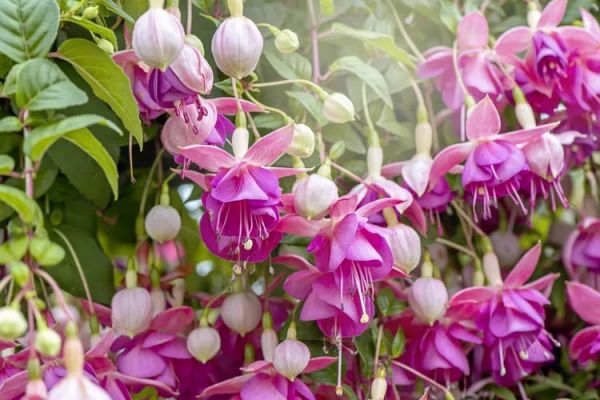
- Size: 1 to 2 feet tall
- Growing conditions: Partial shade, well-draining and moist soil
9. Hellebore
Hellebores also known as Helleborus spp. that has double, multi-ruffled blooms in soft pink with dark pink tips and thrive in shady areas. They can go into your garden areas that don’t receive full sun.
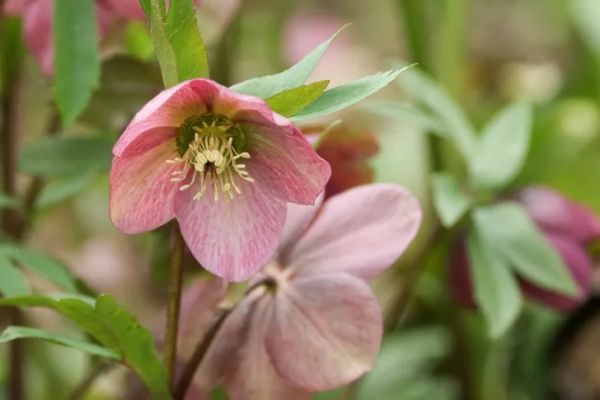
- Size: 1 to 2 feet tall
- Growing conditions: Partial to full shade, based on variety, well-draining soil
10. Hydrangea
Hydrangea also known as Hydrangea spp. is a beautiful flowering plant that has a pom-pom or ball-shaped formation full of blossoms. They can be found in different pink shades, including pastel pink and magenta. They are also known for there long blooming period, providing continuous color and interest throughout the summer seasons.
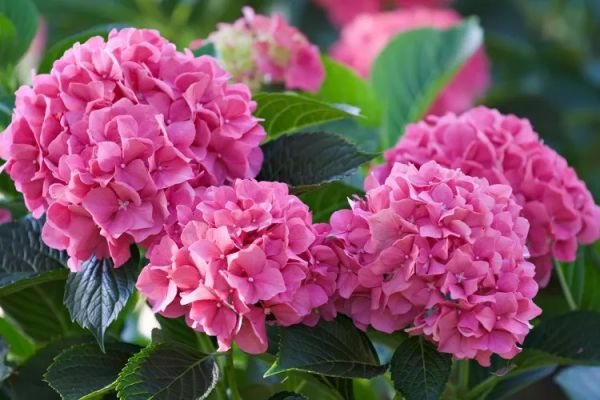
- Size: 2 to 20 feet tall
- Growing conditions: Partial to full sun; moist and well-drained soil
11. Impatiens
Impatiens also known as Impatiens walleriana which has a lot of varieties, including double-flowering impatiens that have more petals but smaller florets. They are one of the easy-to-grow and thrive plants that can even survive without direct sunlight. But if you plant them and give them good soil and keep them moist it will produce an incredible number of flowers throughout the season.
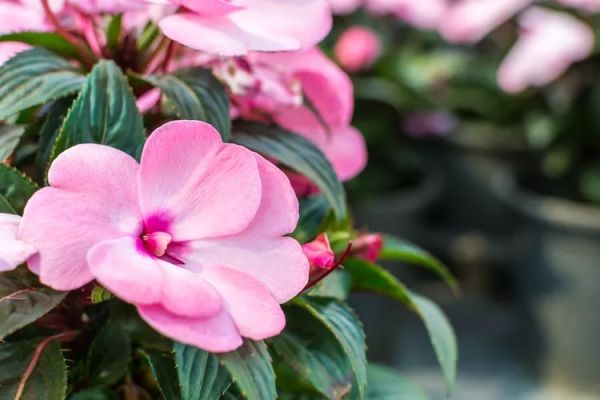
- Size: 6 to 36 inches
- Growing conditions: Partial to full shade; well-draining soil
12. Peony
Peony also known as Paeonia lactiflora can live for decades, is easy to care for, and is also deer-resistant. As long as it gets basic needs like minimum light with water and normal soil they will bloom beautiful pink tones flowers.
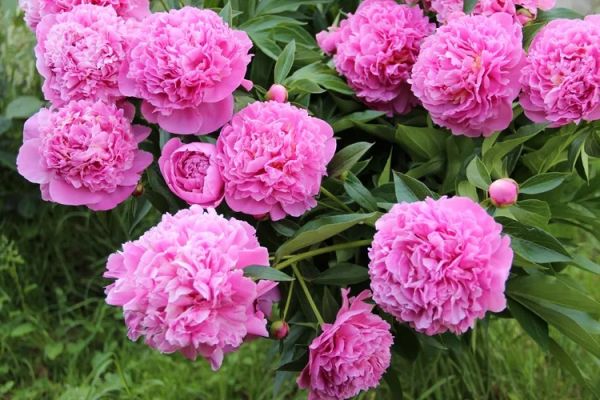
- Size: 2 to 7 feet
- Growing conditions: Full sun; well-draining soil
13. Pink Lily
Pink Lily also known as Lilium spp. is a low-maintenance, easy-to-grow plant that helps bring beauty and elegance to your garden. They are also one of the good choices for planting as border flower plants and as cut flowers, as they are also long-lasting cut flower arrangements.
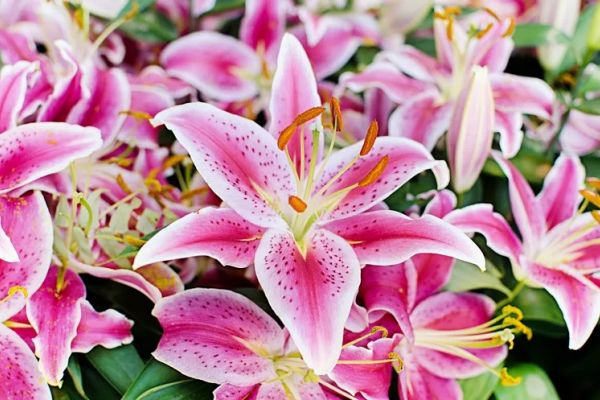
- Size: 2 to 8 feet tall
- Growing conditions: Partial shade to full sun
14. Rose Campion
Rose Campion also known as Lychnis coronaria has a contrast between the blooms and foliage making this a stunning plant for your garden. This drought plant is tolerant and long-blooming with its hot pink-colored flower blossoms on silver velvety foliage.
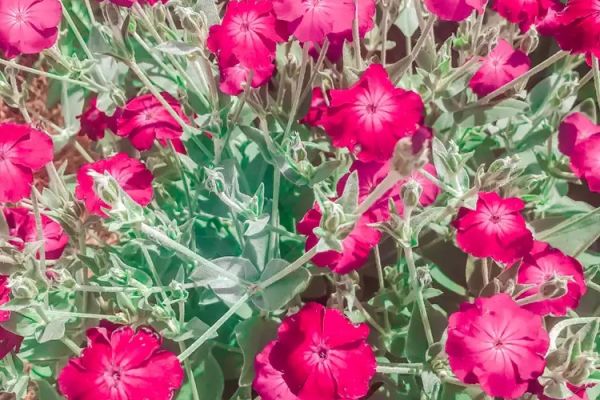
- Size: 2 to 3 feet tall
- Growing conditions: Partial to full sun, well-drained soil
15. Snapdragon
Snapdragons also known as Antirrhinum majus can produce small flowers that look like a dragon snout which can be snapped open and closed when gently pinched. They are hardy annuals that can grow well in cooler weather. Snapdragons are cold-hard plants which means that they can stand light frosts, and often perform better and bloom earlier when fall and left to overwinter.
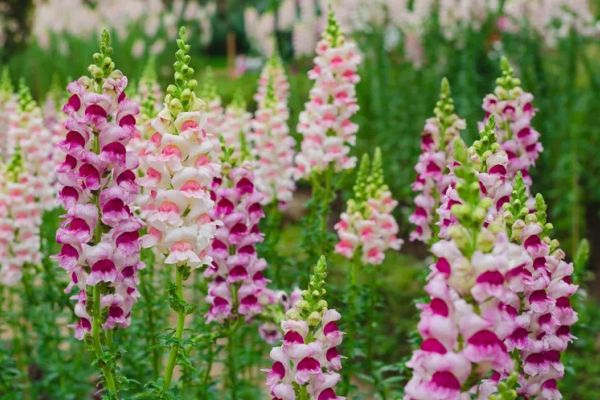
- Size: 6 to 48 inches
- Growing conditions: Partial to full sun; well-drained, moist soil
16. Swamp Milkweed
Swamp Milkweed also known as Asclepias incarnate is a native plant to North America. They have fragrant, pink-hued cluster-colored flower blossoms that provide essential food and habitat for a lot of pollinators. Swamp Milkweed is a host plant for the caterpillars of Monarch butterflies and a nectar source for hummingbirds, as well as many species of beneficial insects from summer to fall.
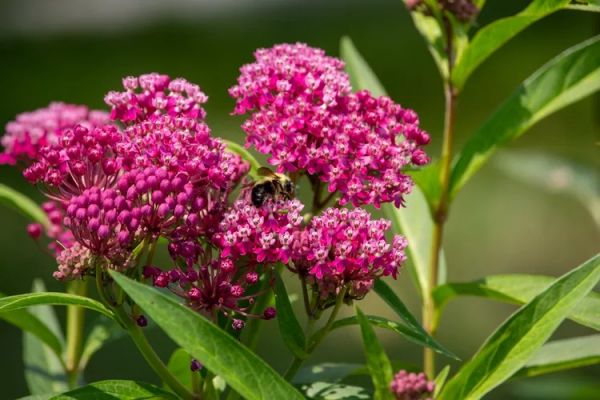
- Size: 3 to 5 feet
- Growing conditions: Partial shade; moist to wet soil
17. Tulips
Tulips also known as Tulipa are a classic spring-blooming plant that is easy to grow and you can choose from a different array of hues, including light pink to magenta colors. Tulips mostly thrive in borders and containers and bring a pop of color to the early spring garden. They are also known to be a great option to add to any bouquet.
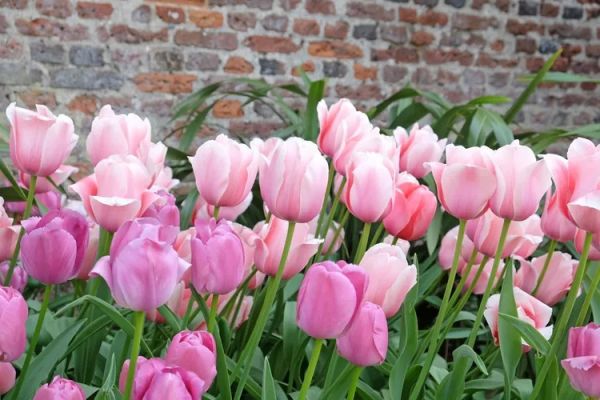
- Size: 9 to 24 inches tall
- Growing conditions: Full sun; well-drained soil
18. Turtlehead
Turtlehead also known as Chelone spp. is a native North American perennial plant that was named after its tubular shape that resembles a turtle head. They thrive moist to wet soil conditions while attracting pollinators like bumblebees and butterflies due to their specialized flower shape.
Turtlehead bloom times are from late summer to early fall. They have a burst of late-season color to gardens and are often used in naturalistic settings, woodland gardens, or alongside water features.
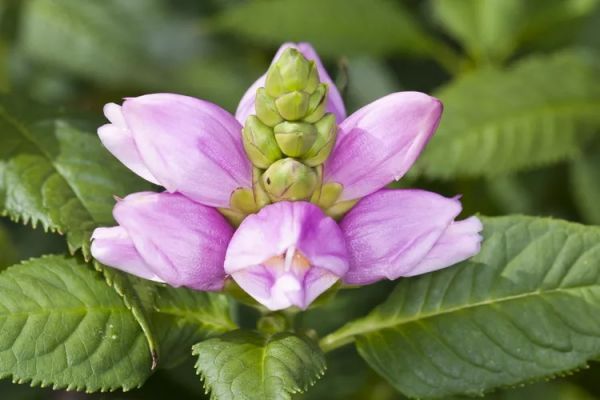
- Size: 1 to 3 feet
- Growing conditions: Partial sun; moist to wet soil
19. Weigela
Weigela also known as Weigela Florida is a stunning bloomer that can help to attract hummingbirds and butterflies to your garden. During the spring season when they bloom, you’ll have a pollinator paradise in your garden. Weigela tiny tubular-shaped flower blooms line up along the plant’s long bending branches during the mid-spring.
-

Source: martha stewart
- Size: 6 to 10 feet tall
- Growing conditions: Full sun; well-drained, moist soil
20. Wild Bleeding Heart
Wild Bleeding Heart also known as Dicentra eximia has pink-colored heart-shaped flowers that bloom from spring through fall and have finely cut, fern-like leaves that help to add delicate texture to your garden. They grow well in shaded places with tubular-shaped hanging flowers.
-

Source: martha stewart
- Size: 10 to 16 inches tall
- Growing conditions: Partial to full sun; moist, humus soil
Also Read: All You Need to Know About National Cheeseburger Day! Find Out Its Recipes, History and More!
